
The eyebrowed thrush is a member of the thrush family Turdidae. The scientific name comes from Latin Turdus, "thrush" and obscurus "dark".

The dusky grouse is a species of forest-dwelling grouse native to the Rocky Mountains in North America. It is closely related to the sooty grouse, and the two were previously considered a single species, the blue grouse.

The New Zealand dotterel is a species of shorebird found only in certain areas of New Zealand. It is also called the New Zealand plover or red-breasted dotterel, and its Māori names include tūturiwhatu, pukunui, and kūkuruatu.
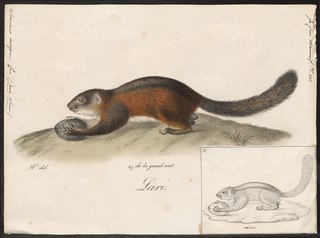
Striped ground squirrels form a taxon of squirrels under the subfamily Callosciurinae. They are only found in Southeast Asia. Species in this genus include:

The dark fruit-eating bat, is a bat species from South America.
The Gotel Mountain soft-furred mouse or Gotel Mountain praomys, is a species of rodent in the family Muridae. It is endemic to the Gotel Mountains in southeastern Nigeria. It occurs in fern-grassland, montane forest, along streams in forest, gallery forest, and swamp forest, at elevations of 1,600–2,400 m (5,200–7,900 ft) above sea level. It is threatened by habitat loss (deforestation), presumably caused by logging and the conversion of land to agricultural and other uses.
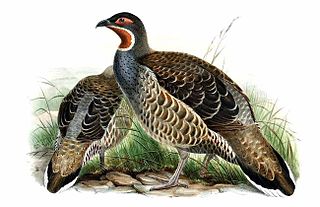
Verreaux's monal-partridge or the chestnut-throated partridge, is a bird species in the family Phasianidae. It is found only in central China. Its natural habitat is boreal forest.
Hyperolius obscurus is a species of frog in the family Hyperoliidae. It is a poorly known species known only from its holotype collected from Sandoa, in Kasai Province, south-western Democratic Republic of the Congo, near the border with Angola. Common name Kasai reed frog has been proposed for it.
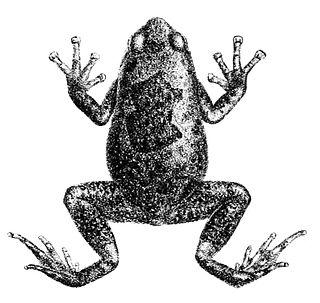
Uperodon obscurus is a species of frog in the family Microhylidae. It is endemic to Sri Lanka. Its natural habitats are subtropical or tropical moist lowland forests, subtropical or tropical moist montane forests, freshwater marshes, intermittent freshwater marshes, rural gardens, and heavily degraded former forest.

The dusky leaf monkey, also known as the spectacled langur, or the spectacled leaf monkey is a species of primate in the family Cercopithecidae. It is found in Peninsular Malaysia, Myanmar and Thailand, and can occasionally be found in Singapore. During the day, these small, folivorous primates divide in sub-groups and forage for vegetation and fruit throughout the tropical forests. According to the IUCN, the dusky leaf monkey's population is declining due to habitat loss, poaching, and anthropogenic land use, which prompted the IUCN to classify the species as endangered in 2015.
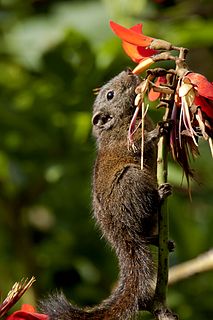
The Nilgiri striped squirrel is a threatened species of rodent, a small squirrel (Sciuridae) from rainforests in the southern Western Ghats, including the Nilgiris, in Peninsular India. It formerly included Funambulus obscurus from Sri Lanka as a subspecies, at which point the English name of the "combined species" also was dusky striped squirrel.
The four-striped ground squirrel is a species of rodent in the family Sciuridae. It is endemic to Borneo. Its natural habitat is subtropical or tropical dry forests. It is threatened by habitat loss.

The three-striped ground squirrel is a species of rodent in the family Sciuridae. It is found in Indonesia, Malaysia, and Thailand.
The Niobe ground squirrel is a species of rodent in the family Sciuridae. It is endemic to the mountains of western Sumatra, and eastern Java, in Indonesia. Its natural habitat is subtropical or tropical dry forests.

The California chipmunk or chaparral chipmunk is a species of rodent in the squirrel family Sciuridae. It is found in Baja California, Mexico and in southern California in the United States.
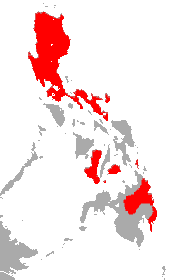
The Philippine forest roundleaf bat is a species of bat in the family Hipposideridae. It is endemic to the Philippines.

Progomphus obscurus, the common sanddragon, is a species of dragonfly in the family Gomphidae, found in eastern United States and southern Ontario.
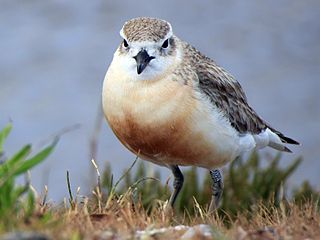
The northern New Zealand dotterel or northern red-breasted plover is a shorebird which breeds exclusively on beaches in New Zealand's North Island.

The southern red-breasted plover or southern New Zealand dotterel is a bird endemic to New Zealand, and was once widespread across the South Island, though now it breeds nearly exclusively on Stewart Island.














